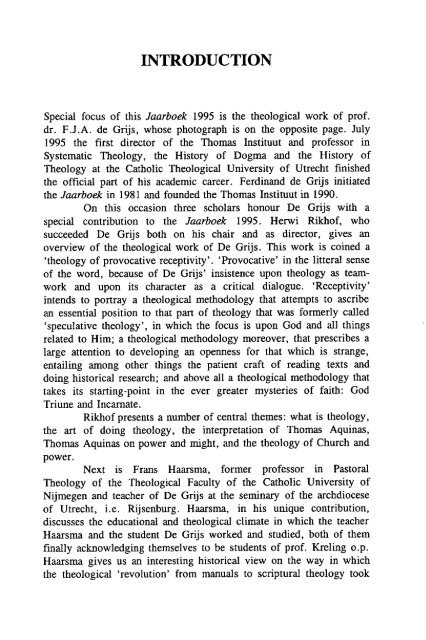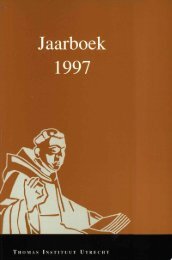Jaarboek Thomas Instituut 1995 - Thomas Instituut te Utrecht
Jaarboek Thomas Instituut 1995 - Thomas Instituut te Utrecht
Jaarboek Thomas Instituut 1995 - Thomas Instituut te Utrecht
Create successful ePaper yourself
Turn your PDF publications into a flip-book with our unique Google optimized e-Paper software.
INTRODUCTION<br />
Special focus of this <strong>Jaarboek</strong> <strong>1995</strong> is the theological work of prof.<br />
dr. F.J.A. de Grijs, whose photograph is on the opposi<strong>te</strong> page. July<br />
<strong>1995</strong> the first director of the <strong>Thomas</strong> <strong>Instituut</strong> and professor in<br />
Sys<strong>te</strong>matic Theology, the History of Dogma and the History of<br />
Theology at the Catholic Theological University of <strong>Utrecht</strong> finished<br />
the official part of his academic career. Ferdinand de Grijs initia<strong>te</strong>d<br />
the <strong>Jaarboek</strong> in 1981 and founded the <strong>Thomas</strong> <strong>Instituut</strong> in 1990.<br />
On this occasion three scholars honour De Grijs with a<br />
special contribution to the <strong>Jaarboek</strong> <strong>1995</strong>. Herwi Rikhof, who<br />
succeeded De Grijs both on his chair and as director, gives an<br />
overview of the theological work of De Grijs. This work is coined a<br />
'theology of provocative receptivity'. 'Provocative' in the lit<strong>te</strong>ral sense<br />
of the word, because of De Grijs' insis<strong>te</strong>nce upon theology as <strong>te</strong>amwork<br />
and upon its charac<strong>te</strong>r as a critical dialogue. 'Receptivity'<br />
in<strong>te</strong>nds to portray a theological methodology that at<strong>te</strong>mpts to ascribe<br />
an essential position to that part of theology that was formerly called<br />
'speculative theology', in which the focus is upon God and all things<br />
rela<strong>te</strong>d to Him; a theological methodology moreover, that prescribes a<br />
large at<strong>te</strong>ntion to developing an openness for that which is strange,<br />
entailing among other things the patient craft of reading <strong>te</strong>xts and<br />
doing historical research; and above all a theological methodology that<br />
takes its starting-point in the ever grea<strong>te</strong>r mys<strong>te</strong>ries of faith: God<br />
Triune and Incarna<strong>te</strong>.<br />
Rikhof presents a number of central themes: what is theology,<br />
the art of doing theology, the in<strong>te</strong>rpretation of <strong>Thomas</strong> Aquinas,<br />
<strong>Thomas</strong> Aquinas on power and might, and the theology of Church and<br />
power.<br />
Next is Frans Haarsma, former professor in Pastoral<br />
Theology of the Theological Faculty of the Catholic University of<br />
Nijmegen and <strong>te</strong>acher of De Grijs at the seminary of the archdiocese<br />
of <strong>Utrecht</strong>, i.e. Rijsenburg. Haarsma, in his unique contribution,<br />
discusses the educational and theological clima<strong>te</strong> in which the <strong>te</strong>acher<br />
Haarsma and the student De Grijs worked and studied, both of them<br />
finally acknowledging themselves to be students of prof. Kreling o.p.<br />
Haarsma gives us an in<strong>te</strong>resting historical view on the way in which<br />
the theological 'revolution' from manuals to scriptural theology took








